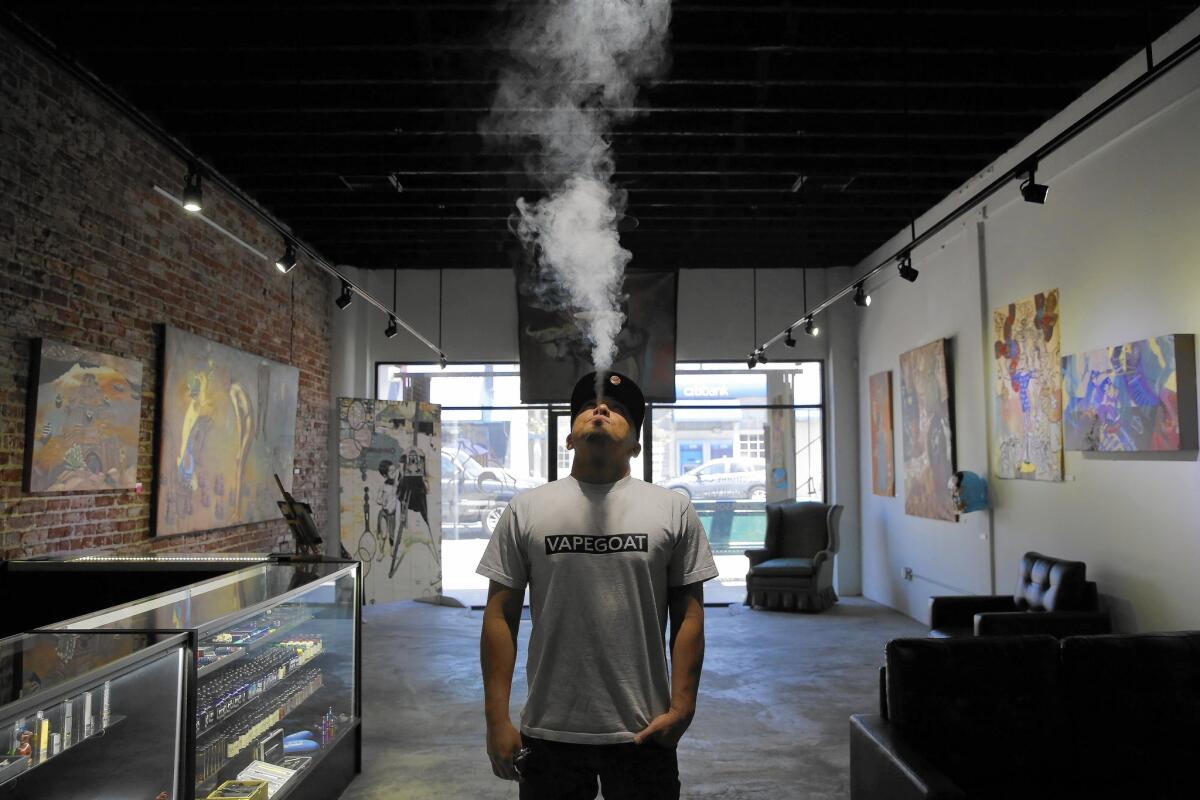Measure to boost voter turnout among bills advanced in state Legislature

Owner Patrick Sanchez smokes an electronic cigarette at Vapegoat in Highland Park. Lawmakers have moved to ban the use of e-cigarettes in public places where smoking is already prohibited.
Lawmakers on Thursday advanced a proposal to require cities with low voter participation to consolidate their elections with the state elections, an effort to bolster civic engagement in some local contests.
The measure is a response to single-digit voter turnout in some city elections. It would require consolidation starting Jan. 1, 2018, in any city with participation of at least 25% below its own average during the last four statewide general elections.
“This is about voters, your constituents, coming out and participating by a greater percentage,” Assemblyman Luis Alejo (D-Watsonville), said during a debate in the lower house. “At the same time, consolidating will provide significant saving to taxpayers, who are currently paying millions of dollars for low-turnout races.”
Many Republicans opposed the measure. Assemblyman David Hadley (R-Manhattan Beach) argued that such consolidation would mean fewer volunteers, and municipal candidates would have to spend more to be heard amid the din of high-ticket statewide campaigns.
“This bill would transform the election process and governance of a number of these cities,” he said. “In many of our cities, it is relatively inexpensive to run for office.”
The bill, SB 415, passed the Assembly and goes back to the Senate for a vote on minor amendments.
In addition, the Assembly sent Gov. Jerry Brown legislation that would bar secret grand juries from considering incidents of excessive or deadly force by police officers.
The proposal followed grand juries’ refusal to indict officers involved in the deaths of Michael Brown in Ferguson, Mo., and Eric Garner in New York City. Those decisions sparked protests across the country and renewed debate on use of force by police, particularly in black communities.
Critics of the grand jury process say such cases should to go through preliminary hearings, which involve judges, prosecutors and defense lawyers and have strict standards of evidence.
“The public has the right to know that such a grave allegation is taken seriously and is investigated thoroughly,” said Assemblyman Bill Quirk (D-Hayward).
Law enforcement groups including the California Police Chiefs Assn. opposed the measure. Sean Hoffman, a lobbyist for the California District Attorneys Assn., said the grand jury system has been “an appropriate and useful prosecutorial tool.”
The measure is SB 227.
Also on Thursday, Brown signed into law a bill that blocks adults sued for sexual assault by minors in civil cases from using the defense that the child consented to the sexual contact.
The legislation was filed in the wake of a case last year in which the Los Angeles school district avoided penalties in a civil suit involving a 14-year-old student who said she was sexually assaulted by a 28-year-old teacher.
In a criminal case, the Edison Middle School teacher was sentenced to three years in prison. But in a civil suit, a jury found for the school district, partly based on the defense assertion that the student consented to sexual activities with her teacher.
“California is taking a decisive step today to close a loophole,” Sen. Ricardo Lara (D-Bell Gardens), author of the new law, SB 14, said in a statement. “Now, sexual predators will no longer be off the hook for child abuse and negligence because of a nuance in law.”
Meanwhile, lawmakers revived proposals that would raise the smoking age to 21 and ban the use of electronic cigarettes in public places where smoking is already prohibited. Similar bills failed in the Legislature last week.
The two proposals are among six tobacco-related bills announced Thursday as part of the Legislature’s special session on health.
Others would close loopholes in laws governing smoke-free workplaces, including hotel lobbies and break rooms; require all schools to be tobacco-free; and allow cities and counties to tax tobacco products.
Those bills will be heard in the special session declared by the governor to address financial issues in healthcare, Assembly Speaker Toni Atkins (D-San Diego) and Senate leader Kevin de León (D-Los Angeles) said in a joint statement.
“Tobacco is the leading cause of preventable death and disease in the United States, and treating tobacco-related illnesses costs California taxpayers billions of dollars,” the statement said. “We applaud our members for taking on this public-health crisis for the people of California.”
Different committees will consider the new bills during the special session, potentially increasing their chances of approval.
patrick.mcgreevy@latimes.com
Twitter: @mcgreevy99
melanie.mason@latimes.com
Twitter: @melmason
More to Read
Sign up for Essential California
The most important California stories and recommendations in your inbox every morning.
You may occasionally receive promotional content from the Los Angeles Times.












